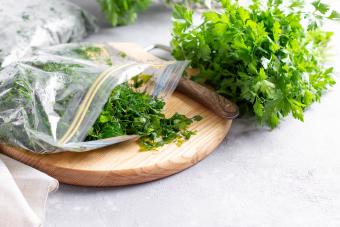
I love the flavor that fresh herbs give to my cooking — but they usually go bad before I finish using them all, and I hate to waste food. That's why I started freezing them. I can buy or harvest as many as I want and preserve their fresh flavor in the freezer after I've used my share, so I don't need to throw them out. Then, in the off-season, I always have my frozen herbs available to add fresh flavor to my cooking. Here are some simple tips for how to freeze herbs.
3 Methods Freezing Herbs (and Why You Should)
Hooray for freezers! They allow me to use more parts of the foods I buy and save the scraps for later. For instance, I'll keep a zipper bag of my veggie trimmings and herb stems in the freezer and pull it out to make tasty stock.
You can harness the power of the freezer for your leftover fresh herbs, too. Frozen herbs retain their taste, smell, and nutritional benefits, so you can freeze a surplus throughout the harvesting season to enjoy later. They'll last up to a year when properly frozen.
How to Freeze Whole Herbs
Hearty herbs such as rosemary, thyme, bay leaf, and oregano freeze well whole. Follow these steps to freeze fresh, whole herbs:
- Give herbs a gentle shake to loosen any debris. If the herbs are very dirty, clean them by misting gently with a spray bottle.
- Place the clean, whole herbs in a freezer bag or freezer storage container. You may also use this method to freeze fresh chopped herbs.
- Label the freezer bag or storage container with the date and name of the herb, and place it in the freezer.
- Once frozen, use the herbs as needed. They'll crumble easily.
How to Make Herb Ice Cubes

This method is perfect for fragile herbs such as mint, dill, cilantro, and parsley or herbs that you plan to use in sauces, soups, and teas.
- Clean and finely chop fresh herbs.
- Fill approximately two-thirds of each section of an ice cube tray with chopped herbs.
- Cover the herbs with olive oil and freeze.
- Remove frozen herb cubes from the tray and place them in freezer bags or freezer storage containers. Be sure to date and label.
- To use herb ice cubes, simply drop them in your recipe as needed.
You can also freeze herbs in water and use them as pretty ice cubes for botanical cocktails or freeze them in broth to use in soups.
How to Freeze Pureed Herbs
Freezing pureed herbs is another easy way to add flavor to sauces and stews.
- Clean and coarsely chop or tear your fresh herbs.
- Puree fresh herbs in a food processor (or blender) with a little olive oil, broth, or water.
- Pour puree into ice cube trays and freeze.
- Once frozen, remove the puree cubes and place in a labeled freezer bag or freezer storage container.
- Remove and use as needed.
Herbs That Freeze Well
Virtually all herbs can be frozen, but some hold up better than others. The Complete Illustrated Book of Herbs by Reader's Digest states that the best herbs for freezing are those that have a high water content or very delicate leaves that may not stand up to traditional drying methods such as:
- Chives
- Parsley
- Basil
- Rosemary
- Mint
- Sage
- Thyme
- Tarragon
- Bay leaf
- Oregano
- Dill
Some herbs may lose color and texture when frozen, so only freeze herbs that you plan to add to a dish for flavor (such as a sauce or stew) or in herbal teas. Frozen herbs should keep in the freezer for up to one year when stored properly. But if they are not appropriately sealed or are frequently exposed to cold air, they may get freezer burn and lose their taste and aroma.
Tips for Freezing Herbs

Freezing herbs isn't difficult, but there are some tips you can follow to be successful.
- Only freeze herbs that are clean and have no discoloration.
- Before freezing whole herbs, make sure they are completely dry (a salad spinner is great for this).
- To avoid unwanted mingling of scents and tastes, avoid freezing strongly scented herbs together. For example, you probably wouldn't want to freeze cilantro with sage or thyme.
- When using a freezer bag, eliminate as much air as possible before sealing the bag.
- You can use mason jars in the freezer to store whole or chopped herbs.
- Use frozen herbs within one year.
Enjoy Fresh Herbs Year Round
While nothing beats adding fresh herbs to a recipe, freezing herbs is the next best thing. It's an economical and easy way to enjoy the culinary benefits of herbs all year long.







